Editor:
Brandon Sweet
University Communications
bulletin@uwaterloo.ca
Registration opens for 2021 Student Mental Health Research Conference
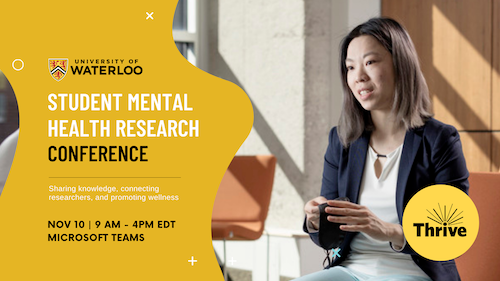
A message from Campus Wellness.
You are invited to attend UWaterloo’s second virtual Student Mental Health Research Conference on Wednesday, November 10th, 2021. The aim of this event is to bring together members of our campus community to share knowledge, connect researchers, and promote mental wellness. Presentations by students, faculty, and staff will explore topics pertaining to student mental health with an emphasis on the following key themes:
- Promotion of mental health-care strategies;
- Suicide prevention;
- Impact of trauma and sexual violence; and
- Impact of COVID-19 on mental health.
Visit the Thrive website to view the agenda and register to attend the conference. See you there.
The simple path to decarbonization
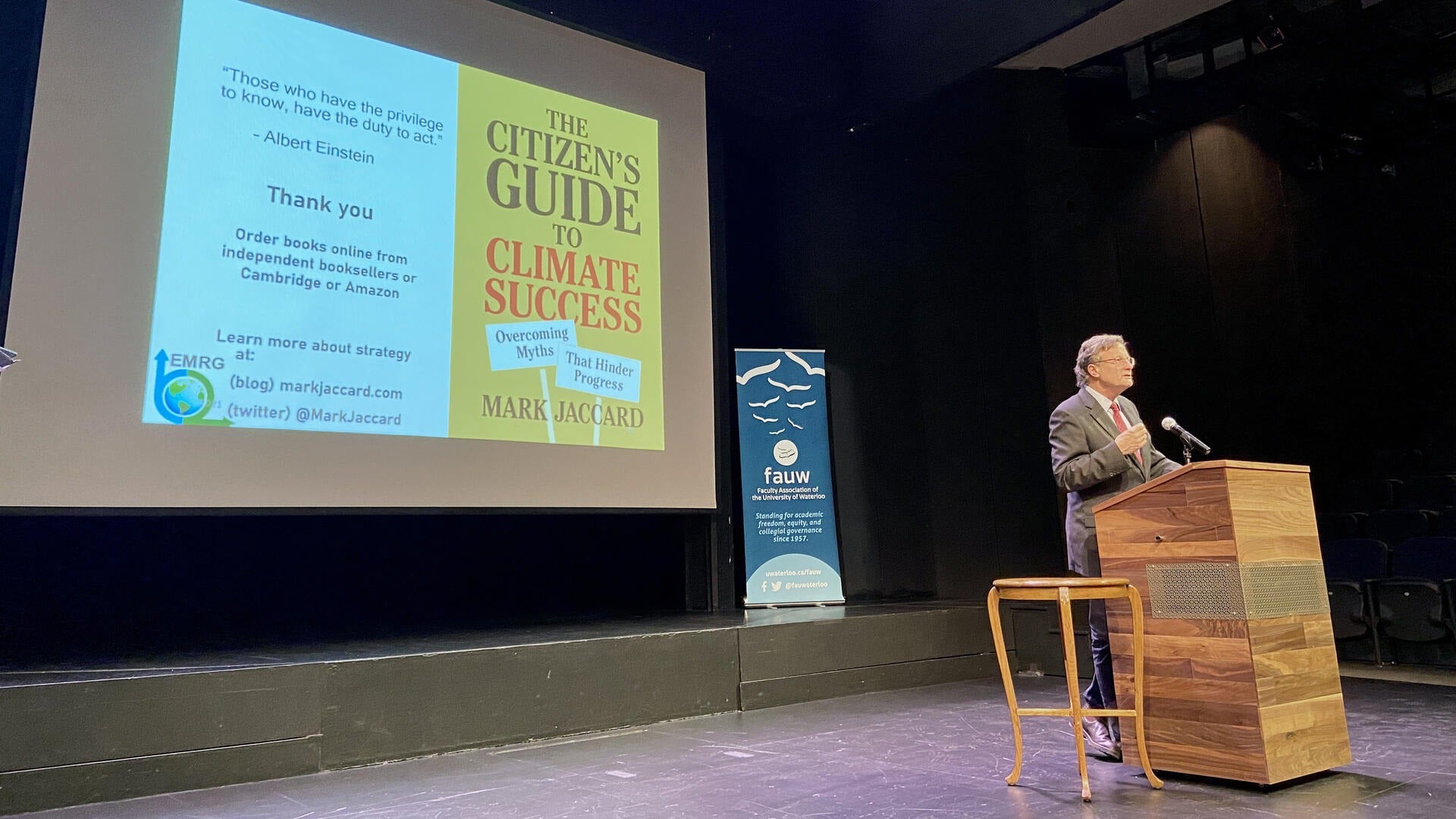
By Jeremy Pittman.
On October 27, the 2021 Hagey Lecture hosted Mark Jaccard, one of Canada’s foremost thinkers on climate change policy and economics. Jaccard delivered his talk to approximately 60 people attending in person at the University of Waterloo’s Theatre of the Arts and 200 people viewing online. Jaccard’s thought-provoking talk focused on four key challenges to decarbonization, two elements of a simple path forward, and four barriers to overcome in order to achieve the simple path. He drew the material from his recent book, “The Citizen's Guide to Climate Success: Overcoming Myths that Hinder Progress”.
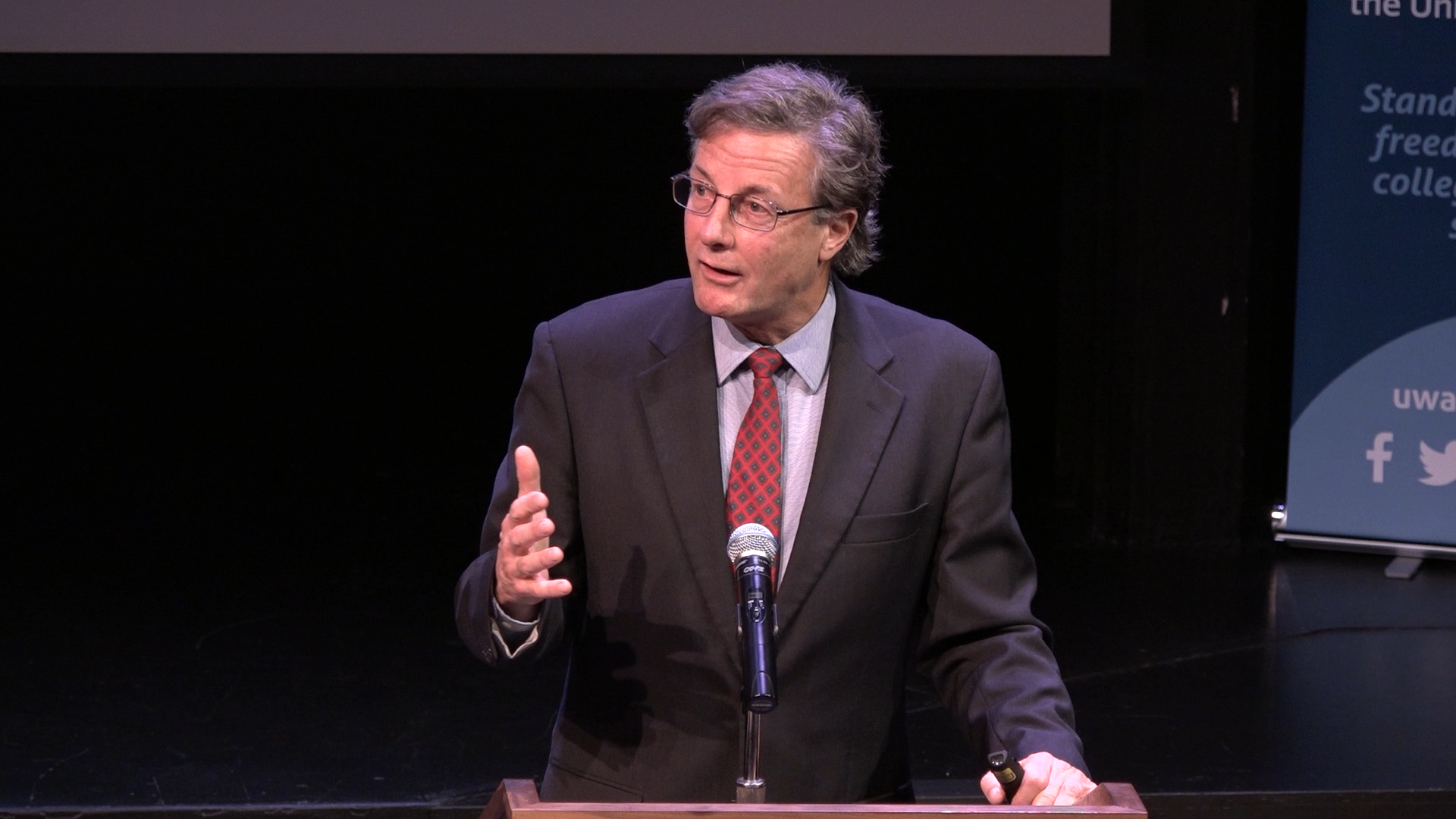
Four challenges to decarbonization
According to Jaccard, there are four key challenges to decarbonization. The first is a myth that fossil fuels are expensive, when in reality they are plentiful and cheap. The second is a myth that a global voluntary agreement will save us, when in reality we have no global government and much disagreement about how to distribute the costs and benefits associated with climate action. Third, there is a myth that sincere domestic policy debate occurs, when in reality the debate is riddled with both sincere and insincere politicians. Finally, we have the myth that decarbonization is complicated, when there is a simple path forward.
The simple path to decarbonization
Jaccard highlighted two key elements on the simple path to decarbonization. First, there is a need to focus on key actions in key sectors. In Canada, these include the electricity generation and transportation sectors, both of which have existing technology that could be implemented to reduce carbon emissions. Additionally, these two sectors are both largely domestic and not exposed to trade, which means their competitiveness will likely not be affected by climate policy in other nations. The second step is to implement compulsory policies, which are the policies that enable effective action on climate change. Jaccard noted that compulsory policies could include things like carbon pricing and regulations, and that regulations could be flexible. He highlighted that there are multiple policy pathways, which can include different combinations of pricing and regulations.
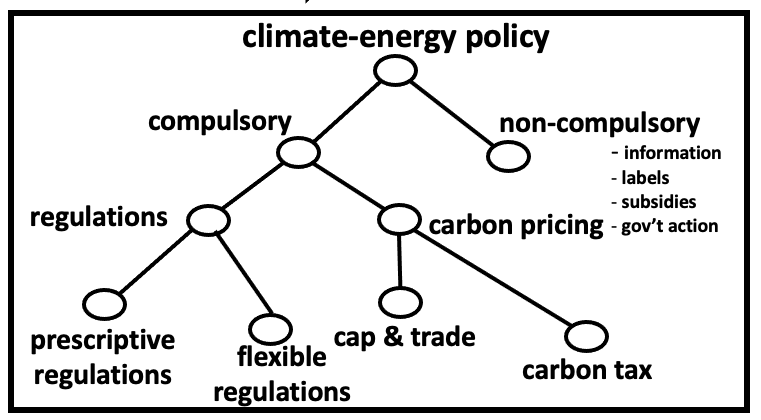
Barriers to the simple path
Although the path to decarbonization can be simple, there are also a number of barriers. First, deliberate deception by key actors or groups can obscure the path forward on climate policy. Second, rigid ‘pro’ or ‘con’ views on climate policy serve to polarize the debate and paralyze climate action. Third, “agenda hitching” or tagging on nearly impossible goals to the advancement of climate policy (such as stopping population growth or abolishing capitalism) can delay climate policy implementation. Fourth, insincere politicians act to advance their own agendas within the climate discourse and detract from action.
Overcoming the barriers
According to Jaccard, we can overcome these barriers using the following key strategies. First, we must engage through citizen activism and strategic voting to elect the more climate-sincere politicians, who will make strong advancements on climate policy, especially carbon pricing and regulations - as well as support for workers, Indigenous people and lower income people affected by the costs of transition. Second, Canada must form alliances with other nations, who wish to make sincere advances on climate policy, especially with advancing financial support for developing countries plus a system of carbon tariffs to make sure that future national governments do not undermine what must be a universal global effort. Third, as individuals, we must undertake the few key actions that substantially reduce our own emissions, namely acquiring zero-emission vehicles and zero-emission home heating systems.
Jaccard’s talk encouraged us to rethink our roles in addressing climate change, both as individuals and as a nation, and provided us with tractable options to advance climate action.
Critical Tech Talk: interdisciplinary series launches November 8

By Wendy Philpott.
Critical Tech Talk is a series of honest dialogues about technological innovation. Produced by the Critical Media Lab and its founding director Professor Marcel O’Gorman (Department of English), the series is a collaboration between co-sponsors Communitech, the Office of Research, and the faculties of Arts, Environment, Engineering, Health, Math, and Science at the University of Waterloo.
Over the series, each of the six faculties will co-host a techno-critical speaker and invite Waterloo students and local tech sector members to participate in an on-stage dialogue and lead post-event discussions online.
“Our university's identity rests on the concept of innovation. But that isn’t enough,” says O’Gorman. “We are not a tech company or lab — we’re an institution of higher learning, and we have a responsibility to promote critical thinking, even if it’s directed at the very concept of innovation. With all faculties involved, the series demonstrates that responsible innovation is not the domain of a single discipline. It should be a priority for our institution.”
On November 8, the inaugural Critical Tech Talk guest speaker is Nicole Aschoff looking at the limits of the digital frontier. She’ll interrogate Big Tech’s power and profit, as it makes our everyday existence ever more enmeshed in the circuits of capital. An editor, writer and public sociologist, Aschoff’s recent book is The Smartphone Society: Technology, Power, and Resistance in the New Gilded Age.
“Nicole makes for an excellent inaugural speaker because her book takes a brutally honest look at the sometimes destructive consequences of technocapitalism. She writes clearly for a broad audience, and her research is thorough,” says O’Gorman.
Critical Tech Talk aligns with Tech for Good. "In 2018, we crafted Canada's Tech for Good Declaration” says Saj Jamal, VP Marketing & Events at Communitech. “Today, trust in tech is at a premium. Building trust into technology is the lens Communitech will apply in the weeks, months and years to come as we execute our founder-focussed True North Strategy."
Join the inaugural Critical Tech Talk on November 8 in-person or online.
Purple4Prevention: SVPRO partners on campaign for consent
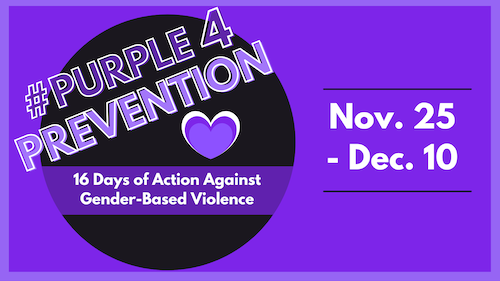
A message from the Sexual Violence Prevention and Response Office (SVPRO).
As part of the annual 16 Days of Activism Against Gender-based Violence (Nov. 25-Dec. 10), the Sexual Violence Prevention and Response Office (SVPRO) at Waterloo is partnering with the Sexual Assault Support Centre of Waterloo Region (SASC), Conestoga College, and Wilfrid Laurier University to address sexual violence on campus through a new campaign: #Purple4Prevention.
#Purple4Prevention invites students and employees to take a stand against sexual and gender-based violence, and to show solidarity by purchasing and wearing the new custom tee shirt on November 25, 2021- the beginning the annual 16 Days of Activism Against Gender-Based Violence, a global initiative supported by the UN.
Get your tee shirt ahead of time through Kitchener Screen Printing or on November 25 by visiting the Sexual Violence Prevention and Response Office at the Student Life Centre on campus. A tee costs only $10, and $3 of each sale goes directly to SASC. If you buy your tee shirt now you will have it to wear on November 25, and you can also continue to show your solidarity during other important times of the year like Consent Week, which takes place in January each year, and Take Back the Night, a march of solidarity that occurs in the fall.
By purchasing and wearing these t-shirts, it shows how many in our communities stand in solidarity on an issue that often feels very solitary and isolating. Wearing these shirts and sharing messages online also creates opportunity for discussion and learning about the role we all play in creating safer campuses and communities.
On November 25, 2021, the beginning the annual 16 Days of Activism Against Gender-Based Violence, a global initiative supported by the UN, wear your tee, post a selfie, and show your support. Learn more about 16 Days of Activism Against Gender-Based Violence.
Link of the day
When and Where to get support
Students can visit the Student Success Office online for supports including academic development, international student resources, immigration consulting, leadership development, exchange and study abroad, and opportunities to get involved.
Instructors looking for targeted support for developing online components for blended learning courses, transitioning remote to fully online courses, revising current online courses, and more please visit Agile Development | Centre for Extended Learning | University of Waterloo (uwaterloo.ca).
Instructors can visit the Keep Learning website to get support on adapting their teaching and learning plans for an online environment.
Course templates are available within your course in LEARN to help you build and edit your content and assignment pages quickly.
The following workshops, webinars, and events are offered by the KL team (CTE, CEL, ITMS, LIB):
- Independent Remote Course Design Essentials, self-directed, continuous self-enrollment course in LEARN.
- Independent Blended Course Design (iBlend), self-directed, ongoing
- Copyright Overview for Waterloo Instructors and Staff - self-directed, continuous self-enrollment course in LEARN.
-
Thirty Minute Thursdays– PebblePad – Offered:November 11, November 18, November 25, 12:00 noon to 12: 30 p.m.
-
Online Instructional Skills Workshop (ISW) (CTE8601), begins on October 22, 8:00 a.m.
-
Getting Ready to Facilitate Online Courses: TA Training, beginning November 1.
Employees can access resources to help them work remotely, including managing University records and privacy of personal information. Here are some tips for staying healthy while working from home.
Stay informed about COVID cases on campus by consulting the COVID case tracker.
The Writing and Communication Centre has virtual services and programs to help undergrads, grad students, postdocs and faculty members with academic writing.
- Meet with writing advisors in one-to-one appointments to brainstorm, draft, revise, and polish. No time for an appointment? Try email tutoring for undergrads.
- Beat isolation and make writing progress at weekly Virtual Writing Cafés for grad students and faculty or PJ-Friendly Writing Groups for Undergrads.
- Take an online workshop or apply to our popular Dissertation Boot Camp program.
- Faculty can request custom in-class workshops for their courses, or the WCC can facilitate any existing workshops for student groups.
Co-op students can get help finding a job and find supports to successfully work remotely, develop new skills, access wellness and career information, and contact a co-op or career advisor.
The Centre for Career Action (CCA) is offering some in-person services for fall 2021. The Tatham Centre is open with front-desk support, limited in-person appointments and co-op consults. Services are also available virtually. Book an appointment online or Live Chat with our Client Support Team. The CCA is here to help.
If you feel overwhelmed or anxious and need to talk to somebody, please contact the University’s Campus Wellness services, either Health Services or Counselling Services. You can also contact the University's Centre for Mental Health Research and Treatment. Good2Talk is a post-secondary student helpline available to all students.
While the Library continues to focus on digital resources and consultations, our spaces are open for the fall term. Dana Porter Library is open Monday to Friday, 9 a.m. to 5 p.m., and Davis Centre Library is open Monday to Friday, 9 a.m. to 11 p.m., and Saturday and Sunday, 11 a.m. to 5 p.m. for drop-in individual study space, bookable individual study rooms, drop-in access to computers and printers, book pick-up services and IST Help Desk support. Special Collections & Archives and the Geospatial Centre will be accessible by appointment. Library staff are available for questions via Ask us. Full details on current services and hours are available on the Library’s COVID-19 Update webpage.
The Faculty Association of the University of Waterloo (FAUW) continues to advocate for its members. Check out the FAUW blog for more information.
The University of Waterloo Staff Association (UWSA) continues to advocate for its members. Check out the UWSA blog for more information.
The Sexual Violence Prevention and Response Office (SVPRO) supports all members of the University of Waterloo campus community who have experienced, or been impacted, by sexual violence. This includes all students, staff, faculty and visitors on the main campus, the satellite campuses, and at the affiliated and federated Waterloo Institutes and Colleges. For support, email: svpro@uwaterloo.ca or visit the SVPRO website.
The Office of Indigenous Relations is a central hub that provides guidance, support, and resources to all Indigenous and non-Indigenous campus community members and oversees the University's Indigenization strategy.
The Waterloo Indigenous Student Centre, based at St. Paul’s University College, provides support and resources for Indigenous students, and educational outreach programs for the broader community, including lectures, and events.
WUSA supports for students:
Peer support - MATES, Glow Centre, RAISE, Women’s Centre - Visit https://wusa.ca/peersupport to book an appointment either in person or online for the Fall term!
Food Support Service food hampers are currently available from the Turnkey Desk 24/7 in the Student Life Centre. Drop off locations are also open again in SLC, DC, DP, SCH and all residences.
Co-op Connection all available online. Check https://wusa.ca for more details.
Centre for Academic Policy Support - CAPS is here to assist Waterloo undergraduates throughout their experience in navigating academic policy in the instances of filing petitions, grievances and appeals. Please contact them at caps@wusa.ca. More information is available.
WUSA Student Legal Protection Program- Seeking legal counsel can be intimidating, especially if it’s your first time facing a legal issue. The legal assistance helpline provides quick access to legal advice in any area of law, including criminal. Just call 1-833-202-4571.
Empower Me is a confidential mental health and wellness service that connects students with qualified counsellors 24/7. They can be reached at 1-833-628-5589.
When and Where (but mostly when)
Healthy Warriors at Home (Online Fitness)
Warriors vs. Laurier Blood Donation Battle. Join your fellow Warriors, donate blood and help us win the Blood Battle against Laurier for a second year in a row. Set up a profile or add the PFL code: UNIV960995 to your account if you have a blood.ca account already. Questions? Contact WarriorsInfo@uwaterloo.ca.
Drop-in to Warrior Virtual Study Halls on Wednesdays from 5:30 p.m. to 7:00 p.m. Come together in this virtual space to set goals and work independently or in groups each week.
Renison English Language Institute continues to offer virtual events and workshops to help students practice their English language skills.
Faculty of Mathematics presents: Graduate Studies Information Day, Tuesday, November 2, 2021. Register today for one of our virtual sessions.
THRIVE: Dance It Out, Wednesday, November 3, 1:00 p.m. (PAC Studio 1). Free for students, staff and faculty. Register now.
Cheriton School of Computer Science Distinguished Lecture Series, Active Inference, featuring Karl J. Friston, Wellcome Principal Research Fellow and Scientific Director, Wellcome Trust Centre for Neuroimaging, Institute of Neurology, University College London, Thursday, November 4, 11:00 a.m. via Zoom.
Arriscraft Speaker Series: Building a domestic revolution featuringJennifer Chan, Melanie Escano & Sakiko Sugawa, moderated by Tara Bissett, Thursday, November 4, 6:00 p.m. Register for this event.
Men’s Hockey vs. Windsor, Thursday, November 4, 7:00 p.m., Home Opener, Residence Day. Purchase your tickets today.
NEW - Men’s Volleyball vs. Western,Friday, November 5, 7:00 p.m., Home Opener. Purchase tickets.